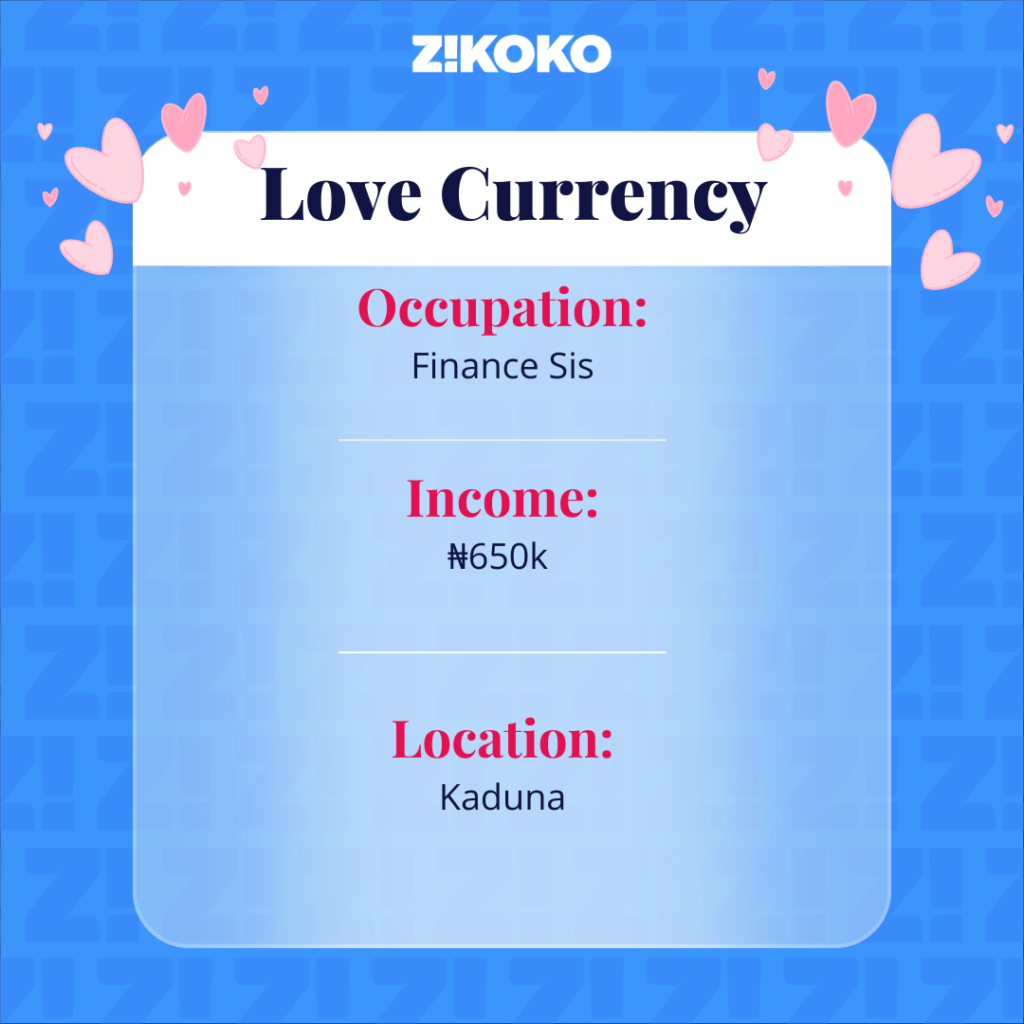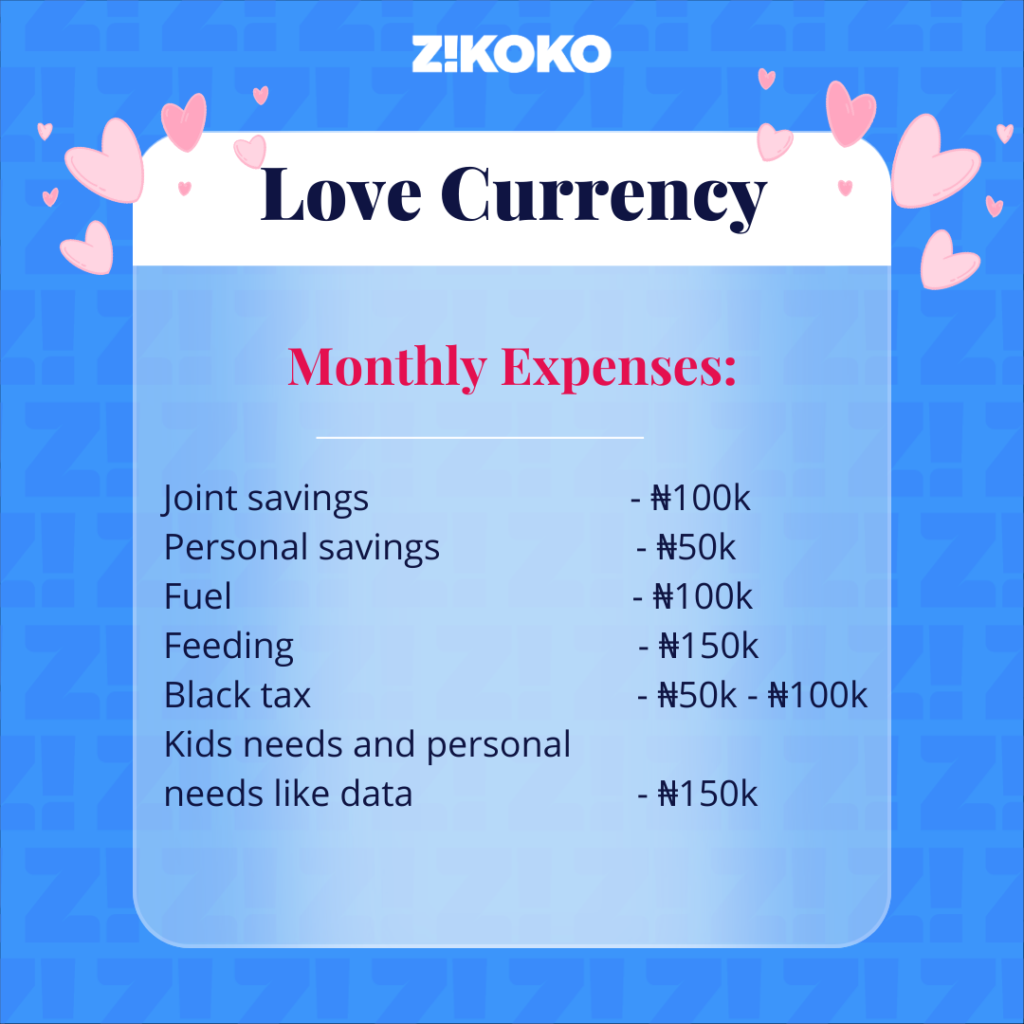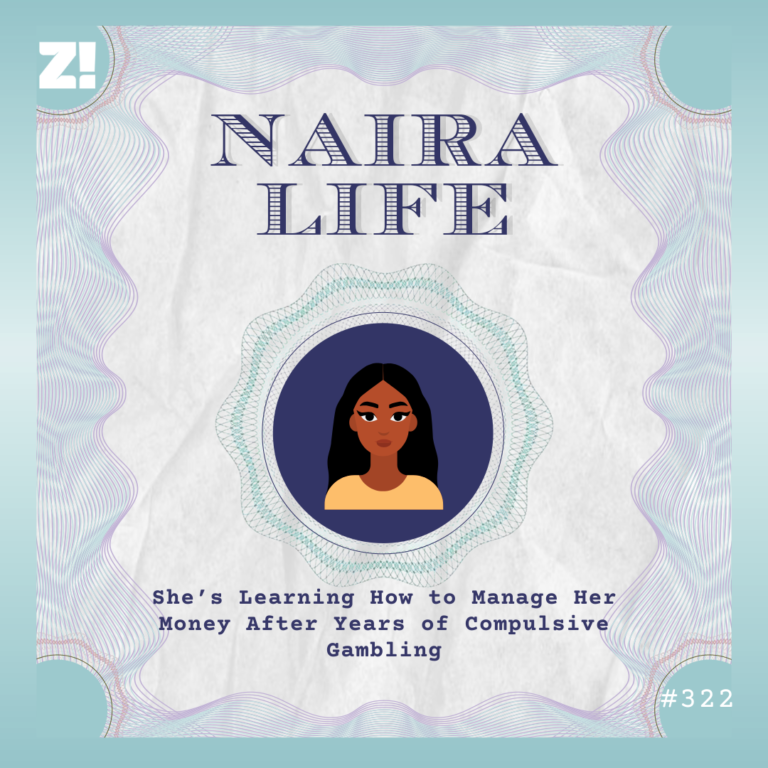The topic of how young Nigerians navigate romantic relationships with their earnings is a minefield of hot takes. In Love Currency, we get into what relationships across income brackets look like in different cities.


How long have you been married?
I’ve been married to my husband for 9 years.
Tell me about how you both met
A mutual friend introduced us in 2014. I was 21 and in my final year of uni, and Ismah was 30 and was already established in his construction career. I didn’t mind the age gap; I was assertive and thought if I married someone in my age group, they would find me overbearing.
Ismah was also straightforward. He told me his intentions as soon as we got talking, and I liked the honesty. We also had really good conversations. That was my major attraction: how much I enjoyed talking to him.
What did you guys usually talk about?
Random things, really. I think I was in awe because he knew so much. I’ve always considered myself an old soul and liked that we could talk about anything.
There was all that talking, but I didn’t ask the important questions like his thoughts about finances and running our home. I knew he was financially comfortable because he didn’t hide it. But I never asked him about money — my parents brought me up to be independent — and I just expected Ismah to know what to do after marriage. Everything was just supposed to fall into place. Maybe I was just naïve.
We got married as soon as I graduated from uni in 2015, about nine months after we met. My religion and culture frown on relationships outside marriage, so we had to make it official as soon as possible. But we soon started having arguments and clashing over finances.
What were the specifics of these arguments?
Ismah didn’t study economics, but he has strict expectations about managing money. Before my marriage, I survived in uni on the ₦30k allowance my civil servant-parents gave me and the small-small things I sold periodically for extra cash. But somehow, my husband believed I didn’t know how to manage resources.
After we married, I moved to join him in another state. None of my family members lived nearby, and my only income was the ₦19800 stipend from NYSC. Ismah gave me a ₦30k monthly housekeeping allowance, which was barely enough for food and other small expenses. But I couldn’t ask for more. The few times I tried, he’d nag on and on about how I couldn’t manage. And it’s not like I was spending the money on myself.
If the cooking gas finished and I told him, he’d be like, “Do you expect me to just pay for it now because you asked?” If a food item finished in the house and I mentioned we had to stock up, he’d ask if I wouldn’t have survived if we had less. He could have ₦2m, but if he budgeted ₦2k for an item and an emergency came up that required more money, he wouldn’t budge.
I was uncomfortable with constantly defending myself and even grew scared of asking for money. Whenever I ran out of money, I preferred asking my siblings for loans rather than asking my husband. It made me all the more determined to look for a job.
Did you find one?
I did. I got one at a microfinance bank in 2017, and it paid ₦35k/month. By then, I already had two children, and Ismah didn’t want me to take the job. He thought it was too small, but I knew the drama I faced with money issues, so I held it with both hands.
I should mention that he’d increased the housekeeping allowance to ₦60k in 2016 after I complained about needing money for personal needs. Adding my salary, my total income grew to almost ₦100k, and it all went to transportation, feeding and other expenses for myself and the children.
Did you and Ismah have any activities you did to spend time together?
During our first year of marriage, we went everywhere together — to events and the like. We also had conversations when we weren’t arguing about money. But things changed after the children came into the picture. I became the primary caregiver.
Initially, I didn’t mind since my husband handled most of the expenses. But after I got the job, it was clear that I was on my own. I had to enrol the children in a creche before they came of school-age, and he was like, “You’re the one who wants to work. So, sort it out.” I think that’s when I realised that my marriage wasn’t ideal.
It’s been like that over the years. Ismah drops ₦60k in a month, and I find a way to make it up and keep the house running. His only other concern is school fees, and that’s it. I pay for whatever the kids need in school.
In 2021, I got a ₦250k/month job in the development sector, and he insisted I save ₦150k in our joint account and survive on the rest.
It was difficult because things were more expensive compared to 2015, but I guess it helped because I used the savings to buy a car in 2022. I just didn’t like how the tight leash on my money meant I couldn’t assist family members. I was still supposed to take out of the ₦100k I had left if I needed to travel home or fix anything in the car. If I asked, it was like, “Are you not working? Why is this my problem?”
The simple way to explain this situation is that I don’t feel financially secure with my partner. I don’t have a safety net or a sense of security with him. I can’t rely on him to come through for me in an emergency.
Have you talked to him about this?
I try to, but he often makes me feel unreasonable. He says he’s saving for the greater good of the family. I don’t even feel seen now. I don’t understand why he won’t budge or try to help even though he sees me struggling. According to him, his work isn’t pensionable, so he has to manage.
Hmm. What are your finances like these days?
I moved to another agency in the development sector this year and now earn ₦650k/month. But I told Ismah I earn ₦400k to have some financial freedom. I’ve reduced my savings to ₦100k despite his complaints.
I also complained about inflation and, last month, got Ismah to increase the housekeeping allowance to ₦80k. He can afford it; he earns at least ₦500k in a bad month, and in a good month, he makes up to ₦2m or more.
Besides the allowance, what kind of money conversations do you both have?
We have differing viewpoints. I believe more in saving, but he’s the type that wants to invest in businesses that require goods and services.
About a year ago, he lost tens of millions in an agricultural business. I warned him about it, but he ignored me. About ₦1.5m of my savings in the joint account also got lost. I think the guilt is why he doesn’t police my savings as much these days. Either that, or he’s just tired of me being “stubborn and financially irresponsible.”
You mentioned saving. How does that work?
I have about $1300 in a savings app. I just started the dollar savings in April and hope to buy stocks when it gets to $3k. I also have ₦650k in something called Mudarabah Savings. It’s like a fixed deposit account, but I get dividends instead of interest (which I can’t receive as a Muslim).
I put ₦50k in that account monthly, and there’s no fixed percentage on the dividend I receive as it’s based on my investment percentage in the pool. But it fluctuates between ₦12k – ₦18k monthly. I also have another ₦250k in another bank that pays a fixed 11% yearly profit.
That’s a sizeable safety net
Well, Ismah and I hardly do things together these days. This is my fault; I limit conversations to when they’re absolutely necessary because he gets upset if I share a different view about a topic we’re talking about. So, I avoid drama.
The kids and work are my life; he does his own thing. I know he has investments and big financial plans, but I don’t see myself in his plans. So, I just plan for myself and the children.
I wonder now if I should ask about your ideal financial future as a couple
I don’t think of money with my partner as a unit. Like I said, I don’t think I’m in his plans. Recently, I’ve felt like our relationship has no future, and we’re just scared to admit it to each other. I don’t feel the love any more.
That said, It’s not like I expect him to get a second wife. I’ve had no reason to suspect him. Besides, if he isn’t spending on me, is it a new wife he wants to spend on? Regardless, I just want to have something to hold on to.
So, for me, I hope to own a house, have a robust safety net and be comfortable enough to take care of my children without many calculations. I’m not keen on japa, but I don’t mind earning in foreign currency and living in Nigeria.
Interested in talking about how money moves in your relationship? If yes, click here.
*Names have been changed for the sake of anonymity.
NEXT READ: The Asaba Freelancer Hoping His Girlfriend Won’t Leave Because of His Unstable Income

Get more stories like this and the inside gist on all the fun things that happen at Zikoko straight to your inbox when you subscribe to the Zikoko Daily newsletter. Do it now!




